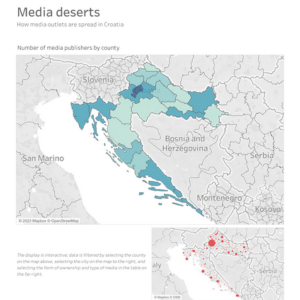
Media should be co-financed through public tenders with clear allocation criteria and independent commissions deciding on fund distribution,” said Melisa Skender, the Secretary-General of the Croatian Journalists’ Association (CJA), in an interview with the European Federation of Journalists (EFJ) published on europeanjournalists.org. She emphasized the importance of vibrant and independent local media serving the public interest as the cornerstone of democratic societies.
The article highlights the pivotal role of such media in empowering citizens to understand and assert their rights within their communities. However, the existence of these media outlets has become uncertain in various parts of the European Union.
Furthermore, examples from Croatia, Turkey, and Portugal are provided, discussing the emergence of “media deserts” in these countries. The term “media deserts” was coined by American scholars and policymakers to describe the crisis facing traditional media and the disappearance of local newspapers as a result of digital transformation and the global economic downturn of 2008.
In the Croatian context, the problematic nature of media registered in Croatian electronic and print media registries is revealed. Many publications, portals, radio, and TV stations are registered as media despite not meeting the criteria. According to the latest official data from the Agency for Electronic Media for 2021, at least one-third of Croatian web portals did not meet the basic requirements to be considered media. Similarly, the print registries list romance novels, comics, puzzles, and horoscopes alongside daily newspapers and political weeklies.
Moreover, many local media outlets are owned by local government units, raising questions about their independence from authorities. The CJA and the Trade Union of Croatian Journalists’ (TUCJ) developed a visualization displaying data on the number of publishers by region and media ownership type.
Skender advocates for public funding of media through transparent public tenders and independent commissions to address these challenges. She also highlights the lack of independent funding models for local media in Croatia.
Lastly, the article underscores the importance of obtaining data to identify trends and react promptly. Sustainable funding models for media houses require independent media to have a fair and equitable position in a sector dominated by government-funded media or media conglomerates.
To address these issues, the LocalMedia4Democracy project, jointly implemented by the EFJ, Journalismfund Europe, the Centre for Media Pluralism and Freedom (CMPF), and the International Media Support (IMS), aims to support local, regional, and social media outlets struggling in “devastated media areas” in Europe through financial support, capacity building, and research initiatives.
Additionally, the first call for applications for the Media Funding Program for Local, Regional, and Social Media in the EU has been launched, with financial support from the European Commission.
For more information, please visit europeanjournalists.org.